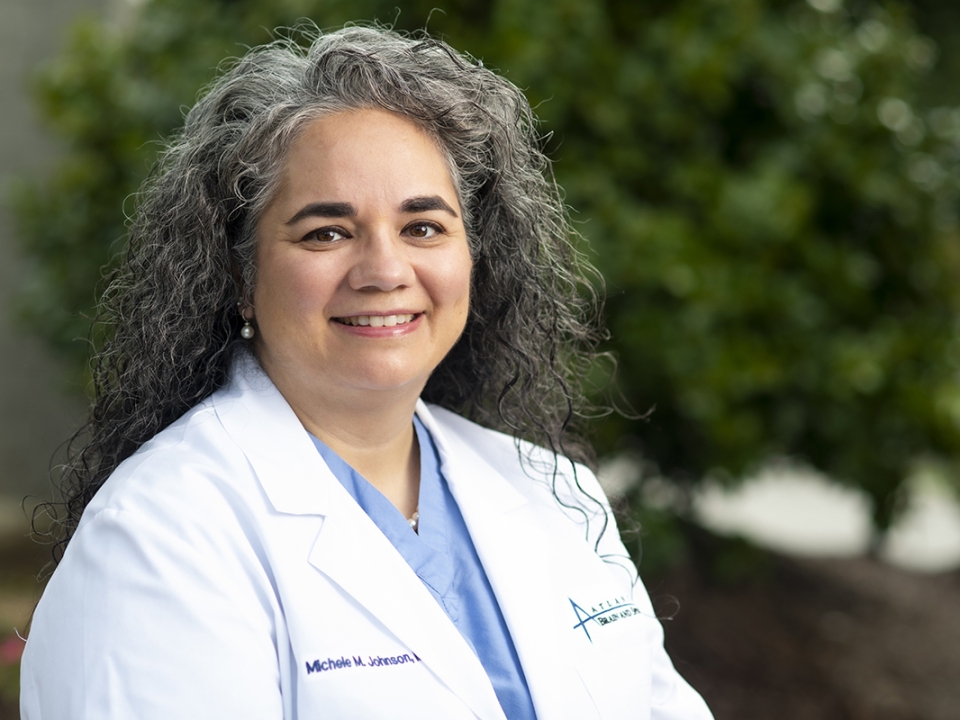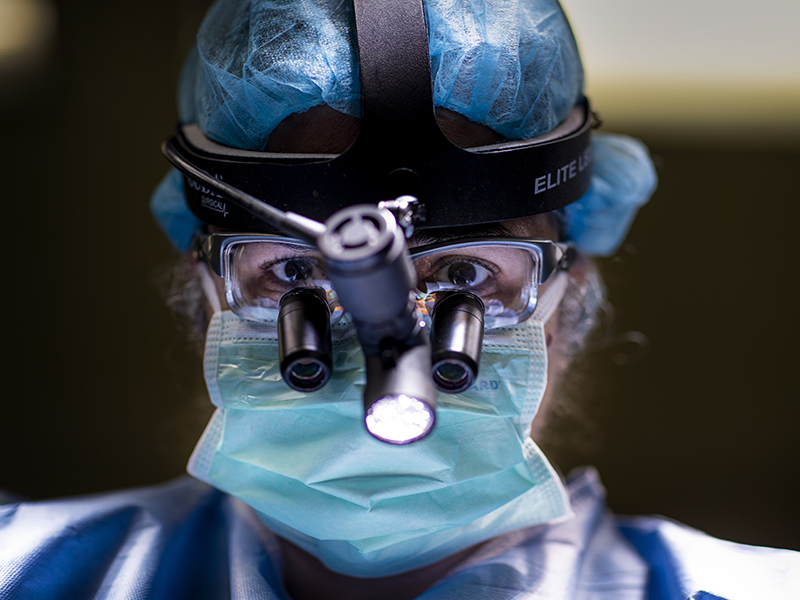Health care news reveals almost daily showdowns between doctors and hospital business offices. The business side is accused of piloting a death star on the public’s finances, while doctors assert patients must rule over the bottom line.
Dr. Michele Johnson, neurosurgeon, is searching for equanimity in this whole “Patient vs. Profit” harangue. She insists the two sides have to be allies for health care to be fixed. She wants to be someone who mends the rift.
So to be able to wear a white coat of a doc and the dark blazer of industry in the same meeting and translate medicine to a successful business model, Johnson went back to school. On March 12, one week before all heck broke loose with the pandemic, Johnson completed her Executive MBA from Terry. She could now get serious in her quest to reinvent health care.
“A lot of the administrative support people of the hospital are usually non-physicians,” Johnson says. “They are very smart people, very business-oriented, and they have been in health care probably for years, but they may not understand the actual operations or the importance of relationships between physicians and patients.
“With the MBA, I can speak the same language of financial terms of hospital supply chain with the administrative executive leadership at the hospital. I can put together a proforma that shows you return on investment and how investing in this now leads to ROI later on.”
The industry is screaming for a mesh in quality — which is the docs’ point of view — and efficiencies — which is the business side POV. Johnson, through her MBA, can better dissect the business model in health care and how and why it revolves around volume and efficiencies. She accepts doctors are as much to blame for the wrangling as the suits.
“As physicians, we don’t learn anything about the business of medicine in school,” Johnson says. “It was all about the practice of medicine, which is what it should be, but when you’re done with residency, you’re then unleashed into the world. You’re the CEO of your own one-person company and you have no business acumen or skill set.
“That is a deficit in medical education. Doctors don’t really know how a hospital runs.”

Johnson has a private practice (Atlanta Brain and Spine Care), but she and Piedmont Hospital are co-dependent because she is also the chairman of the Neurosurgery & Neurology Department at Piedmont Healthcare. She already had an idea of the methods of the hospital. Now that she knows its language because of her MBA, Johnson has a way forward.
“If we have quality initiatives, quality protocols, and we reward quality physicians for doing good work that will help drive down some of the costs of health care,” Johnson says. “Before the MBA, I would have been able to talk things through, but I wouldn’t speak the same language as the hospital.”
Johnson’s ethos is ideal for this quest. She comes from a military family and there was a culture of collaboration and togetherness on a base, she says.
“Being a military dependent kind of made me who I am, which is very collaborative, very team-oriented, very fair so you want to make sure that when you make a decision for a team that everybody on my team does well, not just a few select people,” Johnson says.
It is not just a spirit of collaboration she got from being the daughter of a Navy man, she says. She learned the lessons of trust, loyalty, and trying not to be judgmental. Johnson carried those values as she hopscotched around the country. She was born in Texas, did her undergraduate work at the University of Oregon, her medical school at Yale, and had more medical training at Emory. Then came the MBA at Terry.
“Being a military dependent also makes you very outgoing, you learn how to make friends, you learn how to interact with people from all different races, cultures, genders,” Johnson says.
The other reason Johnson is suited for the uphill task of marrying health care and business is her check engine light never comes on. Johnson is chair of the Clinical Governance Committee for Neurosurgery and Neurology for the Piedmont Healthcare System of 11 hospitals. She is a managing partner in a private practice and developed Piedmont’s systemwide COVID-19 preparedness and protocols for the operating room. This is on top of being the chair of the Department of Neurosurgery and Neurology at Piedmont Atlanta.
She shrugs as if to say her motor is unexplained DNA, then she says, “I think it’s a drive and the desire to want to do more.”
Doing more in medicine never means doing less with her family.
They say we expend unfathomable energy only when we are passionate about something. Johnson, no doubt dog tired during the pandemic, chipped in with her husband to teach her children how to play poker and how to do their laundry while they were home-bound. She learned how to play Nintendo and, no doubt worked them over in chess. She is the only physician on the Board of Trustees at Pace Academy where her children go to school and was devoted to pandemic planning at the school.
“I don’t define myself by my job,” Johnson says. “One thing I make sure is that my family never suffers because of the number of hours I spend at work.”
Johnson goes to their baseball games in scrubs because trauma has no schedule. While she was earning her MBA, Johnson says she and her classmates on projects did their teamwork later in the evening after her boys, 8 and 10, were in bed.
Johnson is a high-achiever, but when you watch her boys bounce around on a Sunday morning there isn’t a hint of pressure of trying to keep up with super Mommy. It is a rollicking household with bike rides, basketball, golf, video games, and more. Johnson says her husband, Anthony, typically travels for his job in pharmaceuticals, but he is grounded by the pandemic so Daddy Day Camp became a thing over the summer.
When it comes to schoolwork, her boys wanted to be proud of Mom’s work on the MBA. They stalked her test scores and report card. They raced to the computer to check out her grades, which were A’s stacked on A’s.
“I don’t know what they would have said if they saw an A-minus or B,” Johnson says with a chuckle.
Johnson’s grades had a certain gravitas with the boys. They know she means business when it comes to schoolwork. She had a rule of no pajamas for school on Zoom, but the boys do not let her micromanage. Johnson will map out a schedule, then at the end of the day, one of them will say to her, “We didn’t follow your schedule, Mommy.”
“We tried,” said Anthony.
Johnson, who is among the seven to 11 percent of practicing women neurosurgeons in the U.S. in any given year, said she has curbed those tendencies toward micromanaging. She understands she is that person who tried to do everything. “It’s a challenge sometimes,” she says.
Argy Russell, the admissions director for Terry’s Executive and Professional MBA Programs, says what struck her most about Johnson was her dexterity, not in being able to handle different tasks in the curriculum, but how she could be intellectual and thoughtful in the same moment. Russell said Johnson wants to be a thought leader in health care, but “in a holistic way”, not in the unsparing way we typically think of with leaders.
“I found her a mix of intellectual horsepower and relatable personality,” Russell says. “I saw her humanity shine through.”

The intellect and humanity were put to the test in the pandemic where health care issues collided with business issues.
When the pandemic hit, the first thing Piedmont did as a hospital system, she says, was close down elective cases to allow for a surge. It was imperative the operating room did not take up resources. Supply chain management was a challenge because of the suddenness of the pandemic, but the hospital system never got to the point where it ran out of supplies or ICU beds, Johnson says.
There were collaboration and understanding from neurosurgeons to postpone surgeries, which is not easy when a patient is faced with a non-malignant brain tumor. Hospitals started losing money because they were not able to churn elective volume while taking care of patients stricken with the virus.
Finally, as the surge subsided, there was a recovery plan.
“This is where a lot of the resources from the MBA came in,” Johnson says. “We were able to then make a proforma as to what can we do as a group of physicians and what resources we need from the hospital. We had to have a recovery plan to make up our volumes because we all had a wait list of 30-50 patients, people we had put on hold for four to six weeks, and we how do we best get those patients through the system safely.”
Johnson says the business side started to hum again from the operating room, to supply chain, to staffing. It was remarkable work — business married with medicine — and she had not one, but two front row seats, one for the medicine and one for the MBA.

